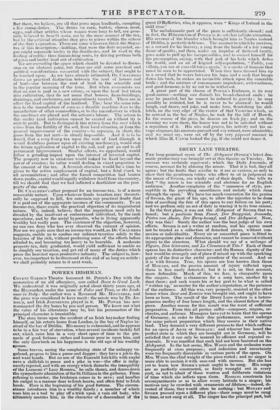POWER'S IRISHMAN.
COVENT GARDEN Theatre honoured St. Patrick's Day with the restoration of an old afterpiece, now called Born to Good Luck. We understand it was originally acted about thirty years ago, at the Haymarket, under the name of False and True, or the Irish- man in Italy: the author was a Reverend Mr. Me ULTREE, and the piece was considered to have merit: the music was by Dr. An- ?OLD, and Irish JOHNSTONE played in it. Mr. POWER has now reanitnated the dry bones by pen and person. We know not what the value of his alterations may be, but his personation of the 'principal character is irresistible.
The story turns upon the accident of an Irish haymaker finding himself, on his return home from London, in the bay of Naples in- stead of the bay of Dublin. His money is exhausted, and he appears to be in a fair way of starvation, when several incidents luckily fall out, which raise him in a very short space of time to the pin- nacle of good fortune: riches and honour pour in upon him, and the only drawback on his happiness is the old age of his wealthy spouse.
Some bravos, seeing 'the complaining state of the unhappy va- gabond, propose to him a purse and dagger: they have a job to do, and want hands. But no son of the Emerald Isle kills with aught save a shillelah in peace and a pike in war—the offer is indig- nantly rejected, and with an energy which disturbs the tranquillity of the Lazaroni (" Lazy Roonies," he calls them), and draws down the sympathetic admiration of the St. Gillians in the galleries. From refusing to murder, the Irishman comes in to save; and handles his cudgel in a manner dear to Irish hearts, and often fatal to Irish heads. Here is the beginning of his good fortune. The circum- stance introduces him to a wealthy family ; a member of which Uses him as a tool to play off a trick upon a vain old body, who ultimately marries him, in- the character of a descendant of the
great O'Rafferties, who, it appears, were " Kings of Ireland in the ould time."
The melodramatic part of the piece is sufficiently absurd ;' and in fact, the Hibernicism of POWER is its sole but infinite attraction. His account of the blunder which brought him to Naples instead of Dublin, is perfectly delicious. The manner in which he receives, as a reward for his bravery, a ring from the hands of a liar young dame of quality, and then, under an impulse of flattered vanity, goes aside to pull up his inexpressibles, and, to correct himself for his presumption, saying, with that jerk of his body which defies the world, and an air of feigned self-reprobation, "Paddy, you villain, you are at yourold tricks ag-ain, is a stroke of humour that. must be seen to be appreciated. When they have dressed hint up in a sword that he wears between his legs, and a sash that hangs down his back, he makes an invincible a ttack upon the venerable- bride ; and the mixture of consummate impudence, awkwardness,. and good-humour, is by us not to be withstood.
A great part of the charm of POWER'S Irishman, is its rosy good-nature—nothing can disturb his broad-checked smile : he may be puzzled, but he cannot be reduced to gravity ; he may possibly be irritated, but he is never to be alarmed : he would laugh, and dance, and joke, and make love, flourishing his shil- lelah, on the very edge of the crater of that Vesuvius which, as he arrived in the bay of Naples, he took for the hill of Howth. In the course of the piece, he dances an Irish jig ; and on the evening we were there, the house was not to be satisfied without a repetition of it. His airs and graces, his activity and his sa- vage elegance, his amorous pursuit and coy retreat, were admirable; and we must say, were set off by the very piquant manner in which Miss II. CAWSE looked the jig, if' she could not dance it.


























 Previous page
Previous page